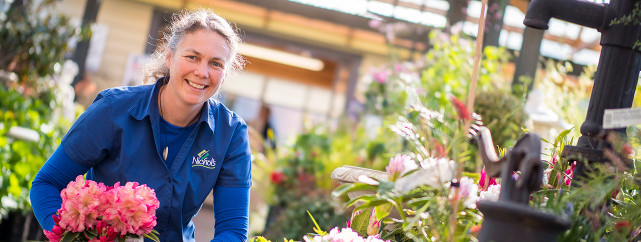
- Location
Dunedin
- Duration
- One year full-time; part-time options available
- Delivery
On campus with hands-on training in the field and four weeks of work experience
- Credits
- 130
- Level
- 3
- Start
- February
- Apply
- Until start date
-
LocationIntakeStudy breaks
-
Dunedin9 February 20215 July 2021 - 23 July 2021
19 April 2021 - 30 April 2021
27 September 2021 - 8 October 2021
-
Dunedin8 February 2022
Do you want to enter the horticulture industry?
New Zealand’s diverse and robust horticulture and related industries have experienced steady growth over recent years and this looks set to continue in the future. This means that qualified and experienced horticulturalists are in demand across the country.
Based in Dunedin, this qualification will give you the work-ready skills needed to enter a range of sectors in the horticulture industry.
During this programme, you will learn about sustainable growing methods, permaculture, plant propagation, plant and soil science, and how to identify and grow healthy plants. In addition, this is combined with the opportunity to develop your skills in amenity horticulture (the care and maintenance of plants in parks and gardens).
You will receive a mix of hands-on and theoretical learning using our nursery facilities, permaculture garden, Living Campus grounds and other sites such as the beautiful, internationally-acclaimed Dunedin Botanic Garden.
Field trips and work experience are important parts of the programme; these will help you to connect with those already working in this dynamic industry.
Graduates of this programme will receive the New Zealand Certificate in Horticulture (General) (Level 3) and the New Zealand Certificate in Horticulture (Level 3) (Amenity).
Skills required
- Physical fitness
- Planning and organisational skills
- Good communication and team work skills
- A good work ethic
- An eye for detail
Entry requirements
- Open entry
- If English is not your first language, you must provide:
- New Zealand University Entrance OR
- Overall Academic IELTS 5.0 with no individual band score lower than 5.0 (achieved in one test completed in the last two years), OR
- Acceptable alternative evidence of the required IELTS (see here for NZQA proficiency table and here for list of recognised proficiency tests).
If you need to improve your English Language skills, we offer a wide range of English programmes.
You will study
| Courses | Credits |
|
Plant and Soil Science (Understand and apply knowledge of plant and soil structure and processes in horticulture)
|
15 |
|
Plant Identification and Selection (Identify, describe, select and name plants in horticulture)
|
15 |
|
Plant Health (Identify and control a range of common pests, diseases, disorders and weeds in horticulture)
|
15 |
|
Sustainable Growing (Understand and apply the principles and practices of sustainable growing systems)
|
15 |
|
Communication (Work as effective team members in the horticulture sector)
|
10 |
|
Health and Safety, Machinery and Lawn Care (Establish and maintain lawns, use machinery and apply health and safety procedures in horticulture)
|
15 |
| Plant Propagation (Propagate plants for use in amenity horticulture)
|
15 |
| Planting (Plant and establish plants in gardens and open spaces)
|
10 |
|
Maintenance of Amenity Areas (Care for, and maintain, parks and open spaces)
|
20 |
Selection procedure
- Applications are processed on a first come-first served basis until the programme has reached capacity.
Your workload
On average you will undertake four days a week of practical instruction and theoretical teaching. In addition to this you will carry out your own self-directed study. It is expected that you will participate in four weeks of work experience during your programme.
Programme specific risks
There are a number of health and safety issues associated with the practical delivery of horticulture training. You will be advised of the physical risks and requirements of the programme either in person or by telephone before you enrol. You will be advised of the need to purchase the listed personal protective clothing and equipment and the reasons for this.
Risks include injury to the body due to the physical nature of horticultural work (manual labour, lifting, bending, uneven terrain, falls from working at heights, eyesight) and from using sharp tools and equipment (secateurs, hand saws, spades, lawnmowers) and small machinery. There is a risk from poisonous plants, insect stings, the physical environment (excessive heat or cold, wet weather), working in isolation, chemical handling (limited) and machinery noise.
Additional costs
You are required to buy some items of personal protective equipment, personal stationery and textbooks. All costs below are approximate only.
- Steel toecap boots ($100 - $200)
- Secateurs ($40 - $120)
- Gloves ($15 - $25)
- Class 5 earmuffs ($40 - $50)
- Safety glasses ($15 - $25)
- Camera ($100 - $200)
- Printing and photo printing ($30)
- Textbooks ($300)
- Stationery ($25)
Financial assistance is available through StudyLink under Course-related Costs. See Student Loans and Allowances section below for more information.
Please note that many suppliers offer student discounts once you have enrolled and it is preferred that you wait until the first week of your programme before purchasing these items.
